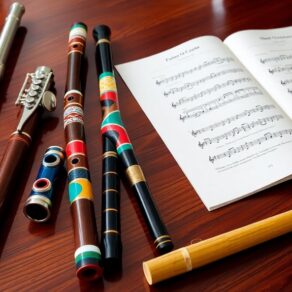Connecting with local flute instructors and guides can tremendously enhance your musical experience. Start by attending local music festivals and workshops; these events are great for meeting instructors and fellow flutists. Consider checking music schools in your area, as many offer trial lessons. Social media platforms like Facebook and Instagram can also connect you to talented teachers—just use hashtags like #FluteTeacher. Don't forget about community boards where locals share instructor recommendations. Engaging in this vibrant community not only improves your skills but also fosters lasting friendships. Keep exploring to discover all the resources available to you.
Key Takeaways
- Attend local flute festivals and workshops to network with instructors and other flutists, enhancing learning opportunities and community connections.
- Utilize platforms like MusicTeachersDirectory.com to find local instructors with detailed profiles, reviews, and teaching styles.
- Engage in social media using hashtags like #FluteTeacher and #FluteCommunity to discover and connect with talented flute instructors.
- Participate in community music schools that offer expert instruction and tailored classes for all skill levels, fostering a supportive learning environment.
- Join online forums and local music groups to share experiences, seek advice, and build relationships with fellow flutists and instructors.
Importance of Local Instructors
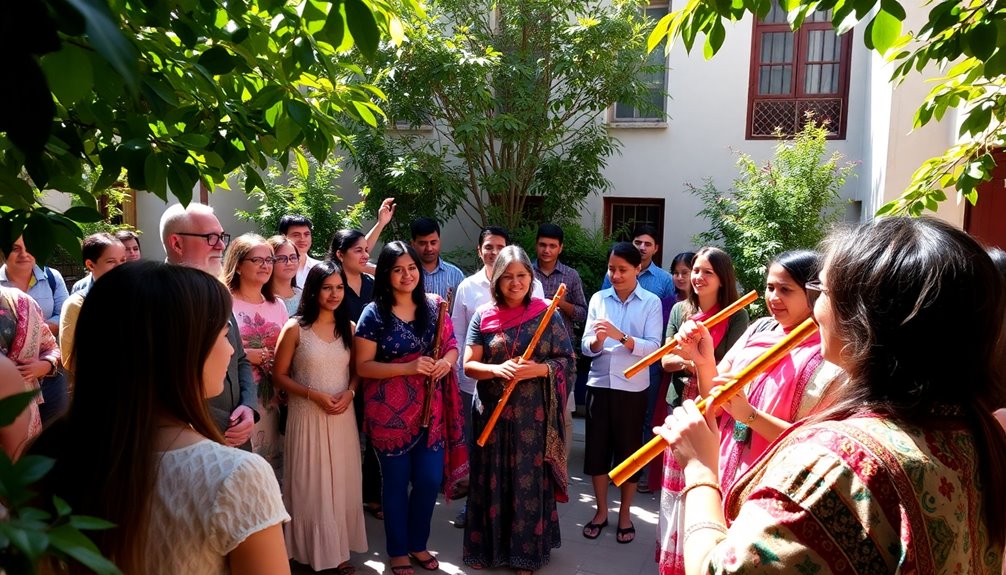
When it comes to learning the flute, connecting with local instructors can make all the difference in your musical journey. Having a mentor right in your community offers numerous benefits that can enhance your experience. Local instructors provide personalized learning tailored to your unique needs, ensuring you progress at your own pace. Rather than relying solely on online resources, you can engage directly with someone who understands your goals and challenges.
One of the key benefits of mentorship is the immediate feedback you receive. In-person lessons allow your instructor to hear you play in real-time, helping you identify areas for improvement. This interaction fosters a deeper understanding of techniques and nuances that might be overlooked in self-guided learning.
Plus, building a relationship with a local instructor creates a sense of belonging. You're not just another student; you're part of a musical community that shares your passion.
Additionally, local instructors often have connections to local music events, workshops, and ensembles. They can guide you toward opportunities that enrich your learning experience and allow you to meet fellow musicians. This network can help you stay motivated and inspired, making your flute journey even more rewarding. Furthermore, local instructors can provide insight into consistent practice schedules, which are essential for developing effective skills and tone.
Where to Search for Teachers
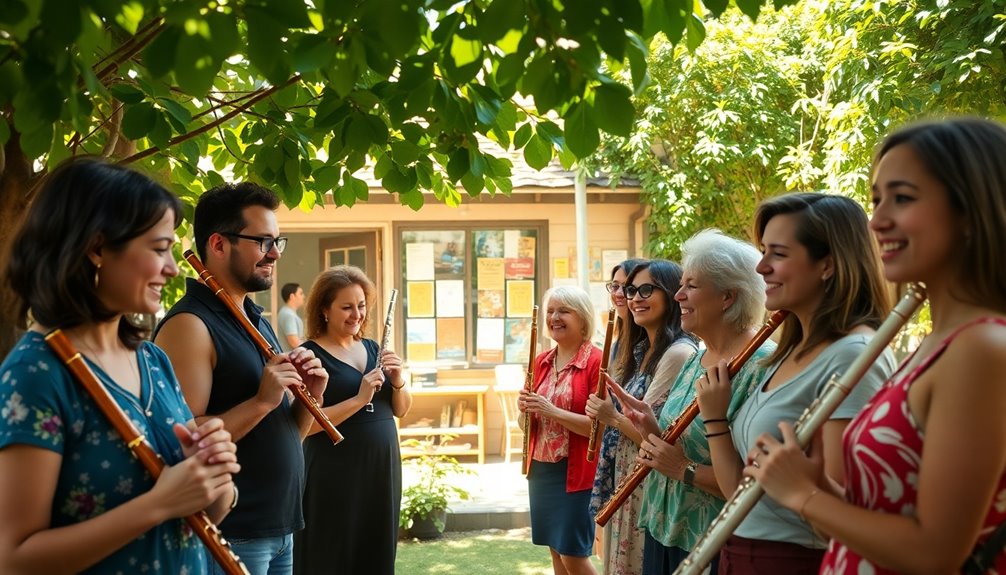
Finding the right flute instructor can feel overwhelming, but knowing where to search can simplify the process. One of the best places to start is at local flute festivals. These events not only celebrate the joy of flute playing but also gather a community of instructors and enthusiasts. You'll have the chance to meet potential teachers, attend masterclasses, and even watch performances that ignite your passion for the flute.
Another excellent resource is music workshops, often held at community centers, schools, or music stores. These workshops can provide you with exposure to various teaching styles, allowing you to find an instructor whose approach resonates with you.
Don't hesitate to ask questions during these events; instructors often appreciate when you show interest in their methods and experiences.
You can also explore local music schools or conservatories, which usually have a roster of qualified instructors. Many schools offer trial lessons, so you can gauge the instructor's compatibility with your learning style before committing.
Lastly, consider reaching out to local music groups or community boards. These platforms often share valuable information about instructors in your area and may even have recommendations from fellow musicians. Additionally, attending local flute ensembles can help you connect with instructors who specialize in teaching beginners.
Utilizing Social Media Platforms
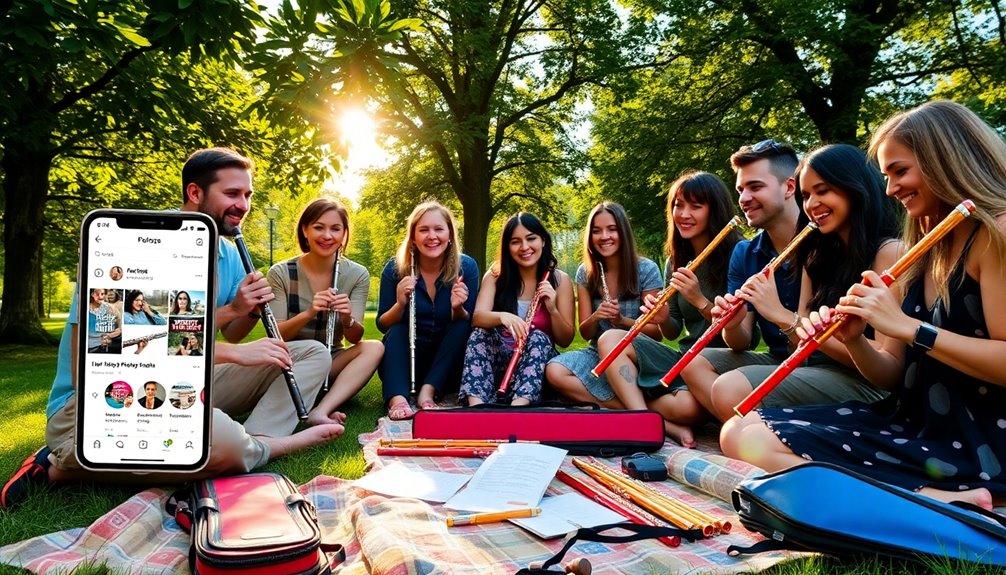
Social media platforms have become invaluable tools for connecting with local flute instructors and discovering a vibrant community of musicians. By harnessing social media engagement, you can find talented instructors, share your journey, and connect with fellow flute enthusiasts.
Platforms like Instagram, Facebook, and TikTok are teeming with musicians showcasing their skills and offering tutorials. Simply search for hashtags like #FluteTeacher or #FluteCommunity to tap into a wealth of resources right at your fingertips.
Consider following local music influencers who specialize in flute. These influencers often share insightful tips, resources, and even host live Q&A sessions. You can learn from their experiences and gain inspiration for your own musical journey.
Influencer collaborations are also a fantastic way to discover workshops or masterclasses in your area—don't hesitate to join in!
Engaging with flute-related posts, sharing your progress, and asking questions can help foster connections. Comment on their videos, join community groups, or participate in challenges.
This not only enhances your learning experience but also helps you feel a sense of belonging within the flute community. Additionally, many instructors may recommend specific brands like Yamaha Flutes that are known for their reliability and ease of play for beginners.
Community Music Schools
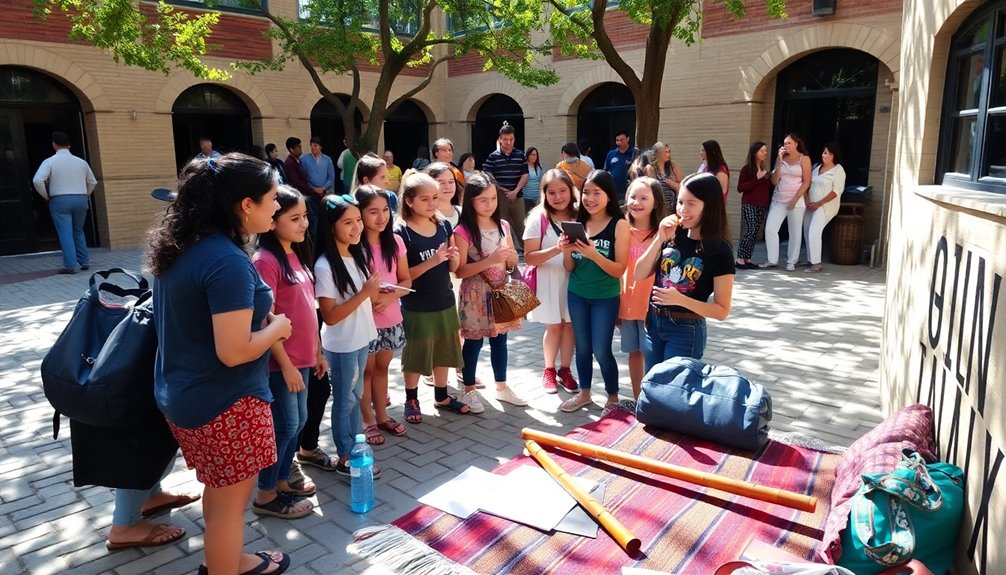
Exploring community music schools can be a rewarding experience for flute players of all levels. These schools offer not just lessons but a chance to connect with fellow musicians in a supportive environment.
You'll find opportunities to grow your skills, meet new friends, and share your passion for music.
Here are some benefits of joining a community music school:
- Expert Instruction: Learn from experienced instructors who specialize in flute playing.
- Skill Development: Whether you're a beginner or advanced, you'll find classes tailored to your level.
- Community Performance: Participate in local events where you can showcase your talent and gain confidence.
- Student Recitals: Enjoy the thrill of performing in front of an audience, celebrating your progress with peers.
- Networking Opportunities: Build relationships with other musicians, potentially leading to collaborations or friendships.
As you engage in the community, you'll discover that these schools foster a sense of belonging. Additionally, you can benefit from the flute's versatility across genres, allowing you to explore and experiment with different musical styles.
You'll be surrounded by others who share your dedication to the flute, making your musical journey even more enriching.
Plus, regular involvement in community performances and student recitals can enhance your skills and boost your confidence.
Joining Local Flute Associations
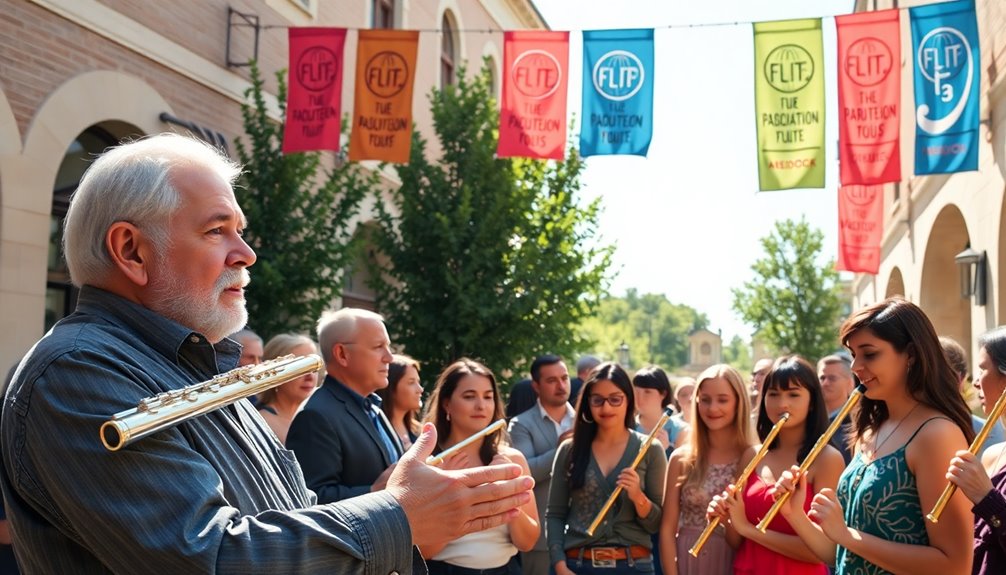
Joining local flute associations can greatly enhance your musical journey, complementing the experiences gained from community music schools. These associations offer you a unique opportunity to connect with fellow flutists, share your passion, and deepen your skills in a supportive environment.
By becoming a member, you'll tap into a wealth of resources, including access to instructor workshops that can elevate your playing. Participating in these workshops allows you to learn directly from experienced instructors, who can provide personalized feedback and share valuable techniques.
You'll not only improve your skills but also gain insights into various styles and genres. Plus, you'll find a community of like-minded individuals who understand the challenges and triumphs of learning the flute.
Local flute festivals are another fantastic benefit of joining an association. These events often showcase talented musicians and provide opportunities for you to perform, whether you're a beginner or an advanced player. Engaging with others at these festivals can boost your confidence and inspire you to explore new musical horizons.
In addition, being part of a local flute association fosters a sense of belonging. You'll meet people who share your passion for music, forming friendships that can last a lifetime. Furthermore, these associations often curate community-curated playlists that enhance exposure to various musical styles, providing skill progression opportunities tailored to different levels.
Networking Through Music Events
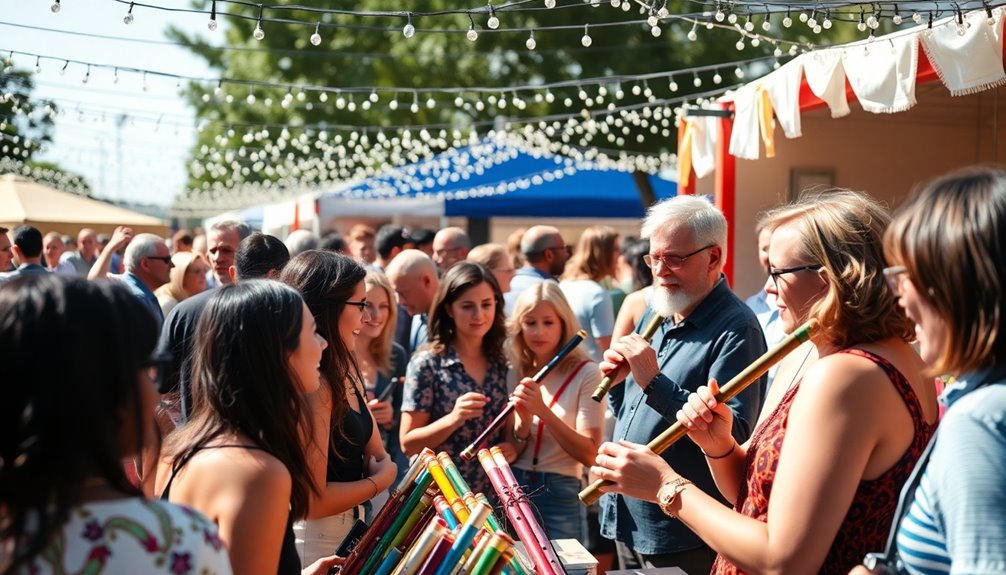
Music events serve as vibrant networking hubs where flutists of all levels can connect, share experiences, and learn from one another.
Whether you're attending a music festival or participating in collaborative performances, these gatherings can open doors to new friendships and opportunities.
Here's how you can make the most of these events:
- Engage with fellow flutists: Strike up conversations during breaks or while waiting for performances to start. You'll be surprised how many people are keen to share their knowledge and experiences.
- Attend workshops: Many music festivals offer workshops led by accomplished instructors. Take advantage of these sessions to enhance your skills and meet others who share your passion.
- Participate in jam sessions: Collaborative performances often feature impromptu jam sessions. Jump in and play along; it's a fantastic way to practice your improvisation while connecting with others.
- Exchange contact information: Don't hesitate to ask for email addresses or social media handles. Building a network is about creating lasting relationships.
- Follow up: After the event, reach out to those you met. A simple message can spark a meaningful connection and open doors to future collaborations.
- Utilize tools like tuner and metronome apps to further refine your skills through practice sessions inspired by your new connections.
Online Resources and Directories
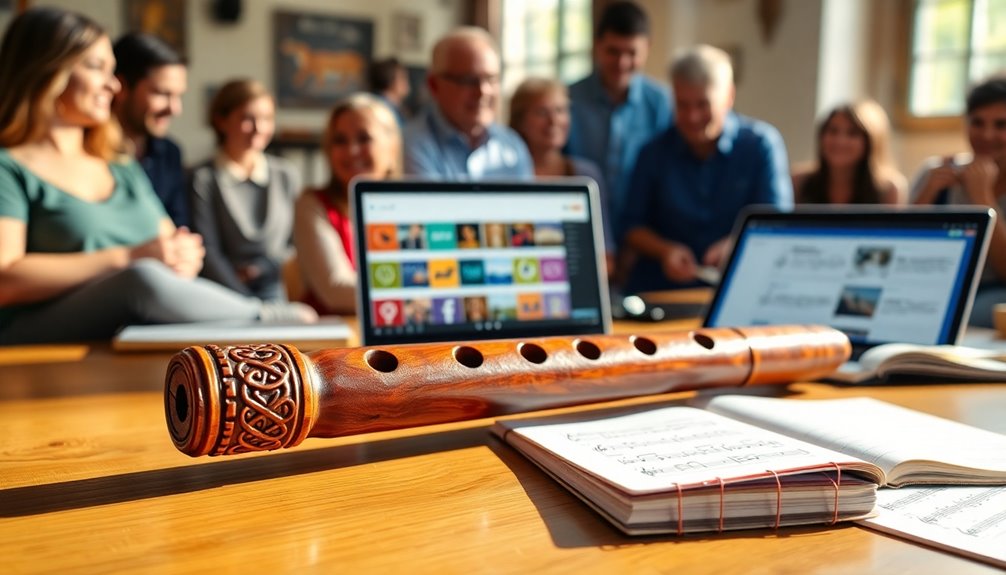
After connecting with fellow flutists at events, you might find yourself enthusiastic to expand your network further. One of the best ways to do this is by exploring online resources and directories dedicated to flutists. These platforms can provide not just a wealth of information but also a sense of community that makes you feel right at home.
Start by diving into online forums where flutists of all levels gather to share experiences, tips, and recommendations. Sites like FluteForum and dedicated Facebook groups can be treasure troves of advice and support. You can ask questions, seek feedback on your playing, or even find a mentor.
Plus, engaging in discussions allows you to connect with others who share your passion.
When searching for local flute instructors, make sure to check directories that list teaching credentials. Websites like MusicTeachersDirectory.com or local music schools often provide detailed profiles, including instructors' backgrounds, teaching styles, and student reviews.
This information helps you find someone who fits your needs and learning style.
Additionally, consider the benefits of interactive features offered by many online tutorials, which can complement your lessons with personal instructors. Don't hesitate to reach out to potential instructors via these platforms. A simple message can open doors to invaluable learning opportunities, and you might discover a guide who inspires you.
Frequently Asked Questions
What Qualifications Should I Look for in a Flute Instructor?
When you're looking for a flute instructor, prioritize their teaching experience and performance background.
A seasoned teacher knows how to tailor lessons to your needs, making learning enjoyable. Meanwhile, a strong performance background guarantees they've mastered the instrument and can share valuable insights.
Don't hesitate to ask about their experience with different skill levels—this'll help you feel more connected and supported on your musical journey.
How Much Should I Expect to Pay for Lessons?
When you think about lesson pricing, consider how much you're willing to invest in your musical journey.
Typically, you can expect to pay anywhere from $30 to $75 per hour, depending on the instructor's experience and location.
Budget considerations are essential; if you're tight on funds, you might explore group lessons or online options.
What Age Is Appropriate to Start Learning the Flute?
You can start learning the flute as early as age 6 or 7, depending on your child's development. At this age, kids often have the physical and cognitive skills needed to handle the instrument.
Learning the flute offers numerous benefits, including improved coordination, discipline, and emotional expression. Plus, it fosters a sense of belonging when they join ensembles or groups.
Encourage your child to explore this beautiful instrument and enjoy the journey together!
Can I Take Lessons Online Instead of In-Person?
Sure, you could take lessons online instead of in-person, but why settle for just wearing your pajamas while learning?
Virtual lessons offer flexibility and a wealth of online resources that can enhance your experience. You'll connect with instructors from anywhere, ensuring you find a fit that resonates with you.
Plus, you'll join a community of fellow learners, making the journey more enjoyable.
How Often Should I Practice Between Lessons?
How often you should practice between lessons really depends on your goals and schedule. Aiming for at least 30 minutes a day can boost your skills considerably.
Create a practice schedule that fits your lifestyle, and don't forget to include time for progress tracking. Celebrate small victories along the way!
Conclusion
Finding local flute instructors and guides is like discovering hidden treasures in your community! By tapping into social media, community schools, and local associations, you can access a world of musical wisdom that'll elevate your flute-playing to celestial heights. Don't underestimate the power of networking at music events; it's where inspiration and collaboration ignite! So, immerse yourself, connect, and let your flute journey soar beyond the stars. Your perfect instructor is just around the corner, waiting for you!

